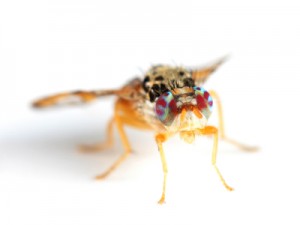Researches at the University of California at San Francisco recently studied the behavior of intoxicated fruit flies (Drosophila melanogaster) that were given the option of drinking alcohol. The study, published Dec. 10, 2009 in the journal Current Biology, found that fruit flies consumed food spiked with alcohol faster than plain food and with preference for alcohol increasing over time. These findings could help researchers better understand the genetic groundwork of addiction.
 Earlier studies have found that alcohol has profound physiological effects on fruit flies, but this new study was the first to offer flies a choice to drink. The researchers devised fly-sized drinking devices similar to water bottles in hamster cages. Flies were then kept inside vials and could drink from with liquid food spiked with alcohol or plain liquid food. The flies drank the former much quicker. The alcohol preference also became stronger over five days as the flies adjusted to the drinking, and flies that had been drinking longer preferred the higher proof mix (15% to 25%) while shorter-term drinkers did not (similar to tolerance).
Earlier studies have found that alcohol has profound physiological effects on fruit flies, but this new study was the first to offer flies a choice to drink. The researchers devised fly-sized drinking devices similar to water bottles in hamster cages. Flies were then kept inside vials and could drink from with liquid food spiked with alcohol or plain liquid food. The flies drank the former much quicker. The alcohol preference also became stronger over five days as the flies adjusted to the drinking, and flies that had been drinking longer preferred the higher proof mix (15% to 25%) while shorter-term drinkers did not (similar to tolerance).
The study also found that fruit flies who became accustomed to the alcohol continued to drink despite potential harm. The researchers laced the food containing alcohol with small amounts of the toxic chemical quinine, and the flies continued to drink, even though they normally avoid the chemical. In another test, the flies were allowed to drink freely for five days, then they were deprived of alcohol for either one or three days. After the “dry period,” the flies immediately returned to peak levels of drinking, demonstrating a hallmark of relapse.
“It’s known that there’s a strong genetic component to alcoholism,” one of the researches said, “and flies are one of the best model systems for genetics.” Researchers hope that the fruit fly model of alcoholism will provide future researchers with new experimental options for understanding the disease.


